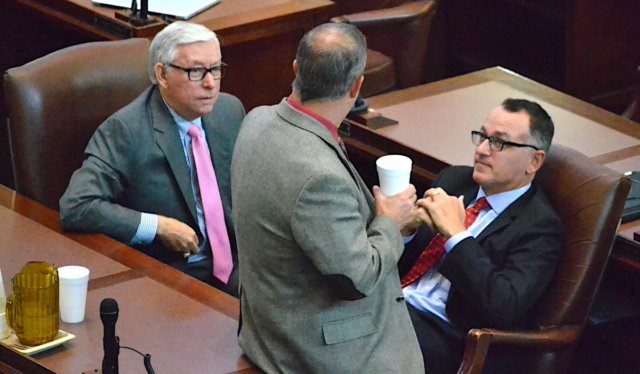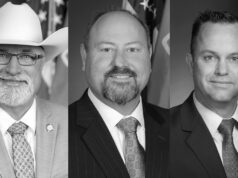

(Editor’s note: This story was authored by Trevor Brown of Oklahoma Watch and appears here in accordance with the non-profit journalism organization’s republishing terms.)
A newly formed group is seeking a state constitutional change that would strip the Legislature of its power to rewrite the state’s legislative and congressional boundaries when redistricting work begins after the 2020 Census.
Represent Oklahoma Inc., which is applying to be a social welfare nonprofit and has launched a website, has set a $400,000 fundraising goal to put a state question on the 2018 ballot that would let voters decide whether to transfer redistricting duties to an independent, nonpartisan commission.
Rico Smith, executive director of the group, said the goal is to take politics out of the process by preventing any party in power from drawing the lines in a way that gives an advantage to their party or a candidate. Six states have independent redistricting commissions, including Alaska, Arizona, California, Idaho, Montana and Washington.
“When we allow the Legislature to draw its own lines, we are saying that citizens’ voices don’t matter,” he said. “This isn’t about party. This is about representing the peoples’ interests.”
Smith has worked on Democratic political campaigns, including Connie Johnson’s 2014 U.S. Senate run and Ron Marlett’s bid for a state House seat in 2016.
Smith said the group’s other staffer, communications director Cate Strider, is a Republican. And he said their soon-to-be-named board of directors will be bipartisan.
Former Gov. David Walters, a Democrat, was the featured speaker at a fundraiser for the group in November. But Smith said Walters does not have an official role with the group at this time.
The initiative is still in its early phases, so it’s unclear whether supporters can get the measure on the 2018 general election ballot.
Smith said the group is working with a law firm and plans to finalize the ballot language by end of this month. Since the proposal would require a change to the state’s Constitution, it will need 123,725 signatures in a 90-day period and clear any legal challenges that may emerge. The 90-day period would begin after the state approves the ballot language.
This also might be the only chance for a change to the state’s redistricting process for the next decade. Rico said it likely would be too late for a 2020 ballot measure to take effect for the next redistricting period because of time constraints.
Redistricting will occur after the U.S. Census Bureau provides states with the latest population figures sometime before the end of 2020.
Oklahoma’s constitution requires the Legislature to pass congressional and legislative redistricting plans within 90 legislative days of the 2021 legislative session. If lawmakers fail to meet the deadline, an independent, bipartisan commission is to be convened as a backup.
If the upcoming process follows the timeline of the last redistricting in 2010, a legislative committee would be formed in 2020; much of the technical work would start in 2019.
Barring major Democratic gains in the Legislature during the next two years, the GOP-controlled Legislature will have the overwhelming say in the redistricting process for the second decade in a row if the ballot initiative is unsuccessful.
‘Wasted votes’
The question of whether political parties have unfairly given themselves an advantage by gerrymandering districts has been a major source of debate here and elsewhere.
Two cases before the U.S. Supreme Court — one accusing Wisconsin Democrats of gerrymandering state legislative districts and the other accusing Maryland Democrats of gerrymandering a congressional district — could set a new precedent for how the court treats unfairly partisan redistricting plans.
One of the plaintiffs’ main arguments in the Wisconsin case centered around a relatively new mathematical measure, called the “efficiency gap,” which is intended to detect evidence of partisan gerrymandering in any state.
The formula is based on looking at the number of “wasted votes” cast for each party’s candidates in an election. The term “wasted” refers both to votes cast above and beyond the 50-percent-plus-one vote needed by a party’s winning candidate and to all of the votes cast for a party’s losing candidate. If 100 votes are cast in an election, and the Republican wins 60 of them compared to the Democrat’s 40, it means nine votes were wasted for the Republican and 40 were wasted for the Democrat.)
In a calculation of efficiency gaps, Oklahoma and 11 other states scored above what some legal experts and academics argue should be the legal threshold for evidence of gerrymandering.
In the 2012 state House election, the first election after the last redistricting, Oklahoma would have failed the efficiency-gap test, according to a study by pair of researchers.
In 2016, Oklahoma Watch calculated the efficiency gap for the two most recent state legislative elections and found the gap exceeded the threshold set by the researchers in favor of Republicans in 2014 and 2016.
The state’s current Senate boundaries were also challenged in court by former Sen. Jim Wilson (D-Tahlequah) following the 2010 Census. But the state Supreme Court rejected Wilson’s lawsuit, saying he didn’t provide “discernible and manageable standards” to prove political gerrymandering had occurred.
Oklahoma’s congressional seats
Less controversial in Oklahoma has been how the state’s five congressional districts are drawn. Those have been largely unchanged since the state lost one seat in 2000.
The status quo likely will be the case following the 2020 Census, too, according to a recent analysis by a national consulting firm.
The study from Election Data Services, using new Census Bureau population estimates, found 12 states likely will lose or gain seats once the final population numbers are calculated.
All three models used by the firm showed Oklahoma failing to grow enough to change how many seats it is awarded in the 435-member U.S. House of Representatives. Nor is it projected to lose a seat.
That means some congressional district boundaries may be tweaked based on population changes within the state. But a wholesale change — usually required when seats are added or dropped — is unlikely unless lawmakers or an independent panel were to throw out the congressional lines and come up with a new set of them.
(Editor’s note: Represent Oklahoma currently has an advertisement featured on NonDoc. The ad space is provided to David Walters as part of our lease agreement for office space. Walters makes all determinations of what organizations receive the monthly ad space.)





















